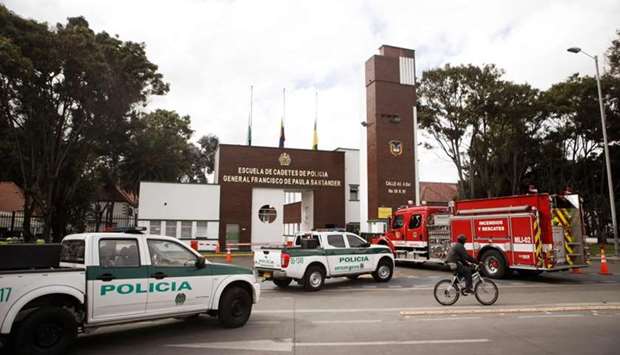The Colombian government on Friday blamed leftist ELN rebels for the bombing of a police training academy in Bogota that killed 20 people as well as the attacker and dealt a body blow to the peace process.
Defense Minister Guillermo Botero, speaking from the presidential palace, described Thursday's car bombing as a long-planned "terrorist attack committed by the ELN."
The attack is a major setback to two years of peace talks with the National Liberation Army (ELN) -- first hosted by Ecuador and currently by Cuba -- that failed to go beyond the exploratory stage before stalling when hard-right President Ivan Duque took power in August 2018.
"The national government knows and understands that the ELN has no will for peace," Colombia's peace commissioner Miguel Ceballos told reporters.
Botero told the same press conference he had "full evidence" that the bomber -- earlier identified as Jose Aldemar Rojas Rodriguez, 56 -- has been a member of the ELN for more than 25 years.
Police said Rojas drove his explosives-packed Nissan pick-up into the cadet school compound, slewing around a vehicle checkpoint, and crashing it into a dormitory building before it detonated.
Some 80 kilos (around 175 pounds) of explosives was used to set off a massive blast that also wounded 68 people. Ten were still being treated in hospital on Friday.
Botero said that at this stage of the investigation police had no evidence to suggest the attacker wanted to commit suicide, and may have intended to set off the bomb with "an electronic device."
According to Botero, Rojas was known by his nickname "One-hand Kiko" for losing his left hand in a blast and was an intelligence chief in an ELN unit operating in the department of Arauca, on the border with Venezuela.
"This was an operation that has been planned for the past 10 months," Botero said, stating that the guerrilla group -- Colombia's last active rebel force -- were the "intellectual authors" of the attack.
The ELN has not responded to the allegations.
Attorney General Nestor Humberto said another suspect also connected to the ELN, named as Ricardo Carvajal, was arrested overnight in Bogota.
Soon after the attack authorities said they had identified the bomber, but added that he had no known links to armed guerrilla groups.
The General Francisco de Paula Santander Officer's School in the south of Bogota is the country's largest police academy and was hosting a graduation ceremony for cadets at the time of the attack.
Rocked by decades of armed conflict involving guerrillas, paramilitaries, state forces and drug traffickers, Colombia has experienced several years of relative calm since the 2016 peace accord signed by then-president Juan Manuel Santos and Revolutionary Armed Forces of Colombia (FARC) guerrillas.
With the landmark agreement turning the former rebels into a political party, the smaller ELN is considered the last active rebel group in the country.
True to his election promises, Duque has taken a hard line against the ELN, including his demand they release all hostages as a prerequisite to kick-starting the peace process. The group is believed to be currently holding 17 hostages, some of them for several years.
"It's highly likely that President Duque will decide in the coming days to break off peace negotiations with the ELN, negotiations which were already deadlocked," according to analyst Frederic Masse.
The ELN, which numbers around 1,800 fighters, has rejected those demands as "unacceptable."
Since the FARC demobilized, the ELN has occupied territory it left vacant and strengthened militarily in many parts of the country.
"The (peace) process was practically concluded," said Ariel Avila, an expert from Colombia's Foundation for Peace and Reconciliation, adding that the bombing amounted to "a declaration of war."
"The attack could be the work of the most radical elements of the ELN, acting with the aim of provoking a rupture in peace negotiations," said Masse.
Masse said the bombing could change the political landscape of Colombia over the coming years, with "an increasingly radicalized and divided ELN guerrilla, a strengthened security policy and the government taking on the ELN in a frontal struggle, plunging the country into a situation of neither war nor peace."
Thursday's bombing was widely condemned. UN Secretary General Antonio Guterres said he stood in solidarity with the people of Colombia and that "the perpetrators must be brought to justice."
Pope Francis, about to embark on a visit to neighboring Panama, condemned the "cruel terrorist attack" in a telegram of condolence to Bogota archbishop Ruben Salazar Gomez.

Police cars and a firetruck are seen outside General Santander Police Academy in Bogota, a day after a car bomb attack
